Newsletter 2025/1
Newsletter 2025/1 - May 2025
Introduction
I am pleased to share with you some of the developments and ongoing initiatives at the Tribunal. This year promises to be a significant year for our work, with a focus both on our judicial proceedings and on our capacity-building efforts.
The proceedings in the M/T “Heroic Idun” (No. 2) Case (Marshall Islands/Equatorial Guinea) and the “Zheng He” Case (Luxembourg v. Mexico) are ongoing, and we continue to approach these important matters with the dedication and impartiality that has defined the Tribunal’s work. As always, we remain committed to ensuring that all cases before us are resolved in a fair and just manner, contributing to the peaceful settlement of law of the sea disputes.
This year has also seen the Tribunal’s capacity-building efforts continue to grow. After a successful workshop co-hosted by the Tribunal and the International Maritime Organization in March, our seventeenth regional workshop has just closed in Viet Nam and we look forward to hosting the fourth ITLOS Workshop for Legal Advisers (sponsored by the Republic of Korea), this time for African States, on the premises of the Tribunal in September. These initiatives are an essential part of our mission to promote greater understanding of the law of the sea and to provide States with the necessary tools in order to facilitate their access to the Tribunal.
As we enter our nearly three decades of service, it is gratifying to witness how the Tribunal continues to play a crucial role in the peaceful settlement of international disputes under the Convention. I am confident that our work remains as relevant and important as ever, and that the Tribunal will continue to serve as a central mechanism in the peaceful settlement of law of the sea disputes. The Tribunal remains dedicated to upholding the principles of the Convention and to ensuring the effective application of its provisions in resolving disputes brought before it.
I hope that you enjoy reading this newsletter.
With my warmest regards,
Tomas Heidar
President
ITLOS Cases
Case No. 32: The M/T “Heroic Idun” (No. 2) Case (Marshall Islands/Equatorial Guinea)
Pursuant to the Order of the President of the Special Chamber of 25 July 2024, the time limits for the filing of the Reply of the Marshall Islands and for the Rejoinder of Equatorial Guinea were fixed at 25 November 2024 and 24 March 2025, respectively. These pleadings were filed within the prescribed time limits. As fixed by Order of 13 May 2025, the oral proceedings will open on 6 October 2025.
Case No. 33: The “Zheng He” Case (Luxembourg v. Mexico)
Pursuant to Order 2025/1 of 3 February 2025, the President of the Tribunal extended the time limit for the submission of the Memorial of Luxembourg to 24 March 2025 and the time limit for the submission of the Counter-Memorial of Mexico to 3 November 2025. The Memorial of Luxembourg was filed within the prescribed time limit.
Interview with Judge Armas Pfirter (Argentina)
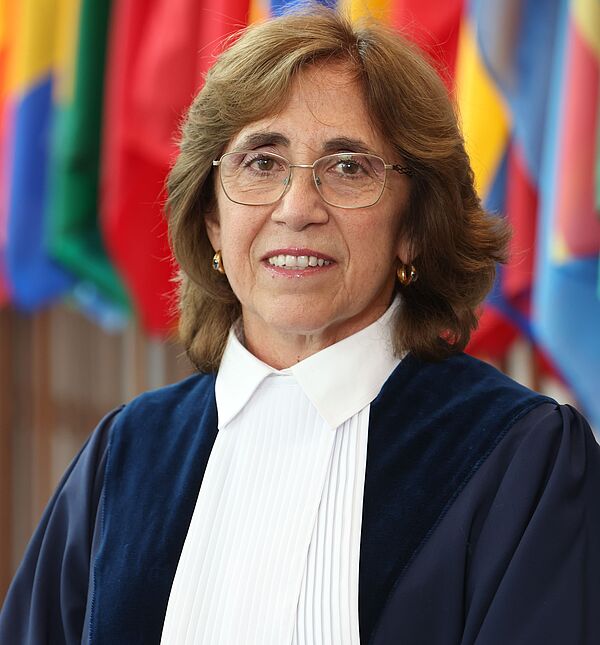
1) On 2 October 2023, you were sworn in as a judge of the Tribunal with five other esteemed colleagues. What have been your initial impressions since taking office, and what are your aspirations for the Tribunal’s role in the coming years?
It was a distinct honour to be sworn in as a judge of the Tribunal nearly two years ago, marking the beginning of a significant chapter in my professional life. Among the six new judges, I am both the only woman and the sole representative from the Group of Latin-American and Caribbean States (GRULAC). My initial impressions have been profound and humbling, shaped by the realization of the honour and responsibility that comes with serving on an institution that plays such a crucial role in shaping the law of the sea.
At the same time, I experienced a deep sense of awe in joining a distinguished group of jurists – many of whom bring over 10 or even 20 years of experience – whose collective efforts are dedicated to extending the rule of law that fosters the peaceful use of seas and oceans. I have been deeply impressed by the professionalism and expertise of my fellow judges and by the strong sense of collegiality and shared commitment to justice within the Tribunal. I felt an immediate sense of welcome and I am thankful to their openness and willingness to share their experiences.
This initial sense of awe has prompted much personal reflection, and it has led me to recognize that while the knowledge we bring to the Tribunal is important, the real challenge lies in applying that knowledge in a way that fosters the peaceful resolution of States’ disputes and ensures compliance with the mandate of the United Nations Convention on the Law of the Sea. This realization instils in me a sense of responsibility that is both overwhelming and motivating. From within the Tribunal, I now see more clearly the immense potential for its future work.
Looking ahead, my aspiration is for the Tribunal to continue to play a leading role in the peaceful resolution of disputes between States and in providing clarity on the increasingly complex issues surrounding the law of the sea. We face significant challenges that demand careful, precise legal interpretations. In this context, the Tribunal’s work in upholding the rule of law is more essential than ever. I am particularly committed to ensuring that the Tribunal’s decisions remain grounded in the principles of the United Nations Convention on the Law of the Sea while also addressing the pressing challenges of our time.
2) Given your extensive engagement in academic and international legal circles, how do you envision the role of ITLOS in addressing emerging challenges to modern ocean governance, in particular with respect to issues such as climate change and deep-sea mining?
Throughout my career, I have held a variety of professional roles, yet my enduring connection to academia has been a constant. Serving as a professor of international law is profoundly rewarding, as it allows me not only to impart knowledge but also to guide young minds as they chart their own paths and contribute to shaping the future of society.
The Convention, like any international treaty designed to withstand the test of time, faces considerable challenges. In addition to the delicate balance of interests it seeks to protect, the Convention must adapt to new scientific discoveries, technological advancements, and the ever-evolving landscape of international law. However, the Convention contains provisions that allow it to adapt to changing circumstances, ensuring that it remains a vital and dynamic instrument, anchored in its fundamental principles. Among these elements, ITLOS plays a pivotal role with its primary function to resolve disputes concerning the interpretation and application of the Convention and any other agreement conferring jurisdiction on it.
One notable example is the Tribunal’s Advisory Opinion on climate change, which marked a significant milestone, as ITLOS became the first international judicial body to address climate change within the framework of the law of the sea. This bold yet firmly grounded ruling underscored the Tribunal’s commitment to addressing urgent issues through a legal lens, consistent with the principles of the Convention.
Turning to the issue of deep-sea mining, the legal community continues to closely monitor the ongoing negotiations regarding the Exploitation Regulations under the auspices of the International Seabed Authority. Many important legal questions are still unresolved, with significant implications for ocean governance and the mandate of the Authority. I am confident that, when needed, the Seabed Disputes Chamber, which identifies itself as “a separate judicial body within the Tribunal”, will continue to play an essential role in interpreting the legal framework for the organization and management of activities in the Area, in accordance with the principle of the common heritage of humankind.
It is also worth noting that States’ commitment to the dispute settlement mechanisms established by the Convention is steadily increasing. Currently, three multilateral treaties enable the possibility of requesting an advisory opinion from the plenary of the Tribunal. Furthermore, the number of both bilateral and multilateral treaties conferring jurisdiction on the Tribunal continues to grow.
3. In your perspective as a Latin American judge, how do you view the role of ITLOS in addressing issues that are particularly relevant to the Latin American and Caribbean region?
Allow me to start my answer to this question by first expressing my deep honour in following two distinguished Argentine judges who have made invaluable contributions to the Tribunal. I am also privileged to serve alongside three other members from the Latin American and Caribbean region.
Latin American and Caribbean States have long been at the forefront of shaping the law of the sea, in particular through their active involvement in the negotiation of the Convention. This influence remains vibrant today, as these States continue to play a key role in the bodies established by the Convention as well as in international negotiations concerning ocean governance.
For instance, the States of the Latin American and Caribbean Group (GRULAC) have initiated the greatest number of cases before the Tribunal, primarily seeking the protection of their flag vessels. Specifically, six different States have acted as applicants in eleven cases, and one has participated as a defendant.
Moreover, issues affecting Small Island Developing States (SIDS), including rising sea levels and climate change, are of particular significance to the region, as almost half of Latin American and Caribbean States are SIDS. Environmental concerns and resource protection are central to the region’s priorities, with the majority of GRULAC States actively engaged in international negotiations on these matters.
Another critical issue is the establishment of the outer limits of the continental shelf. Nearly half of the GRULAC States have submitted, or are in the process of submitting, their limits to the Commission on the Limits of the Continental Shelf (CLCS) and, among them, six States have already received recommendations.
Additionally, GRULAC States have actively supported the interests of landlocked States, in particular during the Third United Nations Conference on the Law of the Sea.
In conclusion, ITLOS’s contribution to the development of the law of the sea is critical for the Latin American and Caribbean region. The Tribunal’s decisions help resolve disputes and set important legal precedents, fostering regional cooperation while ensuring that maritime issues affecting the region are addressed in line with international law.
4. Looking back at your career, what advice would you give to young professionals who aspire to contribute to the development of the law of the sea and perhaps follow in your footsteps?
First and foremost, I would encourage them to cultivate a deep and broad understanding of all the dimensions of this field. The law of the sea is a unique discipline in which international law intersects with environmental science, international relations, and maritime policy, among others. A well-rounded knowledge of these areas will enable one to grasp the complexities of the issues at stake. It is important also to approach this field with intellectual curiosity, an open mind, and a passion for justice and fairness.
Beyond that, I would emphasize the importance of active engagement in academic activities and in international forums, such as UN negotiations, regional conferences, and specialized bodies like ITLOS. Networking and collaborating with professionals from diverse backgrounds – whether they are lawyers, scientists, policymakers or diplomats – is crucial.
I would also remind them that life, including one’s career, isn’t a straight line. There will be ups and downs, and many turning points along the way. At times, we may find ourselves in jobs that are just stepping stones, necessary for paying the bills. But even in those roles, there are always opportunities to add something personal and meaningful. And while doing so, it is essential to keep searching for that spark, that motivation that truly drives us. It’s important to stay open to the opportunities life presents, even if they don’t seem to align with our original plans or expectations. Embrace the uncertainties, take risks when necessary, and remember that professional development is an ongoing journey – it doesn’t always have a clear trajectory.
Finally, my personal advice to young professionals is to always support their colleagues, peers and friends. See your work as part of a team effort, rather than a competition. Remember to also value your family and your personal life – these aspects are as important as your professional identity. Life is interconnected, and being a good professional goes hand in hand with being a good person and friend.
ITLOS Conferences and Events
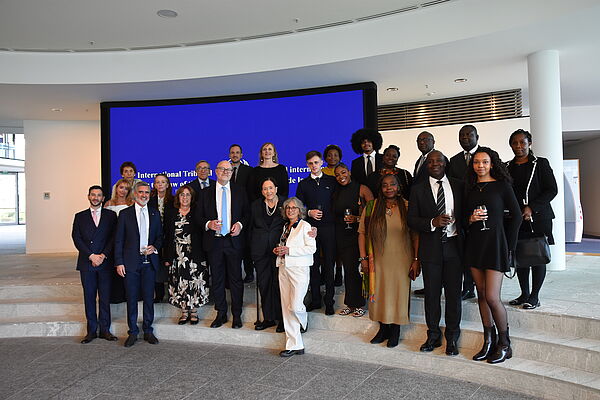
On 8 April 2025, the Tribunal held a naming ceremony at which the Library and Rotunda conference room of the Tribunal were officially named the “Thomas A. Mensah Library” and the “Elsa Kelly Conference Room”. The ceremony honoured the pioneering roles of Judges Mensah and Kelly in the work of the Tribunal and was held in the presence of the judges, members of Judge Mensah’s family and Judge Kelly.
Capacity Building
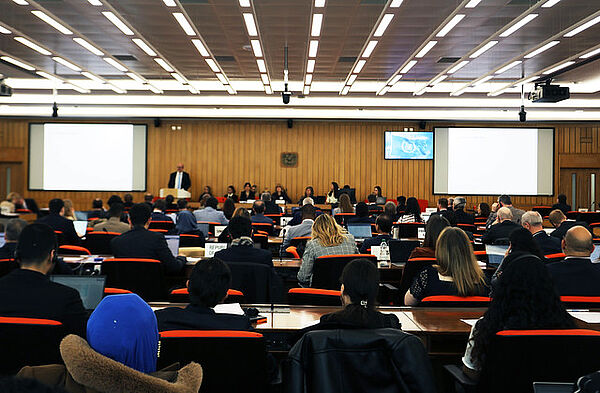
On 28 March 2025, the Tribunal co-hosted a workshop with the International Maritime Organization (IMO) at the IMO headquarters in London on the arrest of vessels and flag State responsibilities regarding ship registration. The workshop was attended by delegates of IMO Member States present for the latest session of the Legal Committee. Presentations were given and moderated by President Heidar, Judges Attard, Lijnzaad and Caracciolo, and Registrar Hinrichs Oyarce.
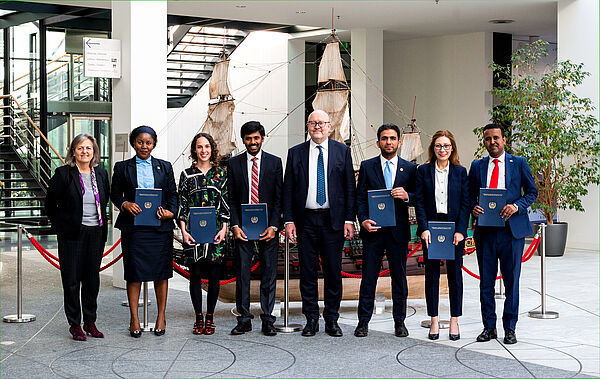
Our congratulations go to Keneilwe Chakalisa (Botswana), Ibrahim Abdu Mohammed (Eritrea), Anita Rayegani (Hungary/Canada), Yousef Salah (Libya), Perumal Thulasidhass (India), and Khawla Wakkaf (Syria) on their successful completion of the eighteenth edition of the ITLOS-Nippon capacity-building and training programme on dispute settlement under UNCLOS. After an intensive nine-month programme of lectures, workshops, study visits and research, the fellows presented their papers to the judges at a final ceremony, at which the President presented them with their certificates.
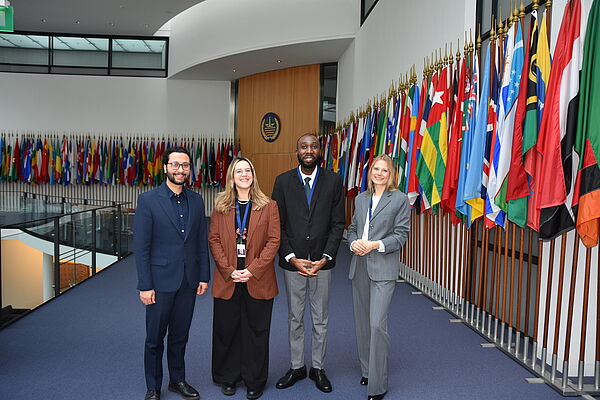
At the start of the year, the Tribunal welcomed Gracious Avayiwoe (Ghana), Golchin Soheil (Iran), Ioanna Koutela (Greece) and Nora Harder (Germany) for internships in the Legal Office. Their respective research topics focused on “The (Ir)relevance of the Provisional Measure Plausibility Requirement at ITLOS”; “The Strait of Hormuz and UNCLOS: Navigating Legal and Strategic Challenges for Iran”; “Fisheries in Disputed Maritime Areas”; and “Golden Constraints: How the Indispensable Third Party Principle Shapes International Justice”. At the start of April, Dylan Andrian (Indonesia), Patricia Pentek (Slovenia), Àlex Peralta Martínez (Spain) and Valentina Urrutia Risso (Uruguay) joined the Legal Office for three-month internships running until June.
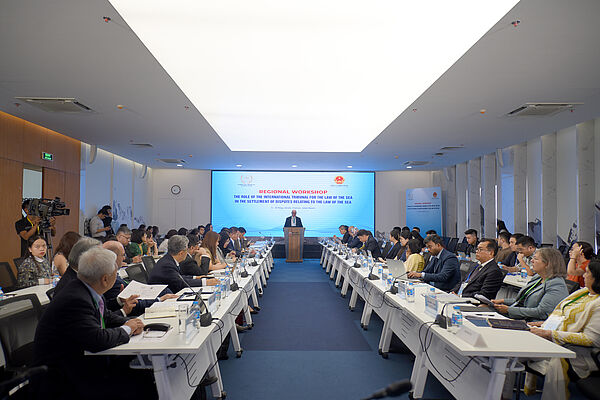
In May 2025, the Tribunal hosted the seventeenth regional workshop on “The Role of the International Tribunal for the Law of the Sea in the Settlement of Disputes relating to the Law of the Sea” in Hanoi. The workshop provided participants with an overview of proceedings before the Tribunal, with sessions dedicated to jurisdiction, urgent proceedings, advisory proceedings and the procedure for bringing cases before the Tribunal. Presentations were given by President Heidar, Vice-President Chadha, Judges Kulyk, Duan, Horinouchi and Rhee, and Registrar Hinrichs Oyarce.
Meet the ITLOS Alumni
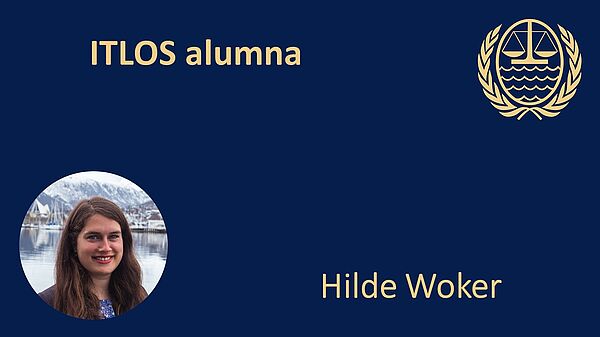
Hilde Woker (Netherlands), Assistant Professor of Public International Law, Leiden University
Next year marks 10 years since I completed my internship at ITLOS. I can’t believe how quickly the time has passed, and yet so much has happened since I took my first steps inside the Tribunal in January 2016. Having just completed an LLM degree in Law of the Sea (UiT – The Arctic University of Norway), I was excited to be at the Tribunal for a few months, learning more about ITLOS’s work and procedure. It was then that I first researched and wrote about the interface between law and science, a topic that still shapes my research agenda today.
After completing the internship programme, I moved back to Tromsø to start my PhD, which would eventually lead to a dissertation entitled “The Law-Science Interface: A Case Study of the Continental Shelf”. Being one of those unfortunate ones to finish a PhD during COVID times, I remember the monthly ITLOS alumni seminars organized by the Press Office to be a welcome distraction from the writing, editing and revisions in my small home office up in the North. In hindsight, it was probably a crazy idea to present my research during one of those ITLOS alumni seminars only four days before submitting my final dissertation, but it was actually a great way to finally see the whole project come together.
I have now been at Leiden University for almost four years, working as an assistant professor of public international law at the Grotius Centre for International Legal Studies, but with a research focus on the law of the sea. I teach a variety of public international law courses at undergraduate and graduate levels, ranging from general foundational issues of PIL to international institutional law and law of the sea. I also teach a law of the sea course at Erasmus University Rotterdam. At Leiden University, I have been awarded a grant for a multi-year research project by the Dutch government, allowing me to continue my research on law-science interfaces. I still work with the continental shelf but also explore issues of scientific standard setting, references to science in the Convention, and the legal regime for marine scientific research. I have enjoyed continuing my research on the law-science interface, something that began at ITLOS and has taken me around the world to various conferences and research stays. It is reflected in various publications and is now the main focus of my current research agenda. Coming full circle, I was honoured to present that research in the ITLOS courtroom during the IFLOS/KMI Symposium in September 2024, the (very early) foundations of which would have been laid during my internship in 2016. It was also a great honour to welcome President Heidar to Leiden in September last year, where he gave the keynote address for our H2OLAW Conference and the inaugural lecture for our LLM programmes in Leiden.
What I love about the law of the sea is that you run into fellow ITLOS alumni and UNCLOS enthusiasts everywhere. It is always such a joy, meeting other ITLOS alumni from around the world at conferences or other events in all kinds of places, meeting up with my co-intern Pia Benosa while we were both coincidentally in Paris, or welcoming ITLOS alumni in Tromsø, exploring Shanghai together, having coffee in Wollongong, champagne in Monaco or lunch in Iceland, being reunited at the Tribunal in Hamburg, seeing each other in online webinars, celebrating a successful H2OLAW conference on a boat tour through the Dutch canals, etc. I look forward to many more of these meetups, and I am so happy to see the ITLOS alumni network grow and thrive, with many thanks to Julia and Rob for helping us stay in touch!
In general, it is safe to say that my time at ITLOS and the people I met there have greatly influenced and shaped my career in the law of the sea. I lecture about ITLOS quite regularly, and I always get an extra sense of joy when I talk about the Tribunal, which is something my students have also picked up on. I believe this is because of the positive experiences during my time there and of all the times interacting with the Tribunal since. I always gladly recommend the internship at the Tribunal to my students, and – in another full circle moment – it makes me very happy that some of them have now had the privilege of doing the internship programme themselves, and to hear about their own adventures and experiences at the Tribunal.
Upcoming Events
The next IFLOS Summer Academy will be held from 13 July to 8 August 2025.
The next ITLOS Workshop for Legal Advisers (sponsored by the Republic of Korea) will be held in September 2025.

